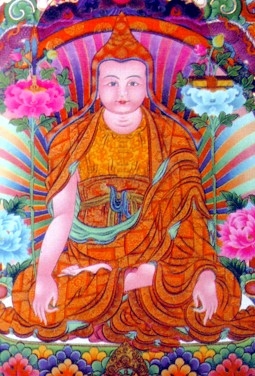Seven Treasuries: Difference between revisions
Jump to navigation
Jump to search
No edit summary |
mNo edit summary |
||
| Line 1: | Line 1: | ||
[[Image:LongchenRabjam.JPG|frame|'''Longchen Rabjam''']] | [[Image:LongchenRabjam.JPG|frame|'''Longchen Rabjam''']] | ||
The '''Seven Treasures''' or Treasuries (Tib. ''Dzö Dün''; [[Wyl.]]'' mdzod bdun'') are works by the omniscient [[Longchenpa]] which, together with the [[Trilogy of Natural Freedom]], represent the extensive, scholarly or [[pandita]]'s approach. They were not originally intended to be a collection. | The '''Seven Treasures''' or Treasuries (Tib. མཛོད་བདུན་, ''Dzö Dün''; [[Wyl.]]'' mdzod bdun'') are works by the omniscient [[Longchenpa]] which, together with the [[Trilogy of Natural Freedom]], represent the extensive, scholarly or [[pandita]]'s approach. They were not originally intended to be a collection. | ||
* The [[Wish Fulfilling Treasury]] (Tib. ''Yishyin Dzö''; Wyl. ''yid bzhin mdzod'') | * The [[Wish Fulfilling Treasury]] (Tib. ཡིད་བཞིན་མཛོད་, ''Yishyin Dzö''; Wyl. ''yid bzhin mdzod'') | ||
* The [[Treasury of Pith Instructions]] (Tib. ''Mengak Dzö''; Wyl. ''man ngag mdzod'') | * The [[Treasury of Pith Instructions]] (Tib. མན་ངག་མཛོད་, ''Mengak Dzö''; Wyl. ''man ngag mdzod'') | ||
* The [[Treasury of Dharmadhatu]] (Tib. ''Chöying Dzö''; Wyl. ''chos dbyings mdzod'') | * The [[Treasury of Dharmadhatu]] (Tib. ཆོས་དབྱིངས་མཛོད་, ''Chöying Dzö''; Wyl. ''chos dbyings mdzod'') | ||
* The [[Treasury of Philosophical Tenets]] (Tib. ''Drubta Dzö''; Wyl. ''grub mtha' mdzod'') | * The [[Treasury of Philosophical Tenets]] (Tib. གྲུབ་མཐའ་མཛོད་, ''Drubta Dzö''; Wyl. ''grub mtha' mdzod'') | ||
* The [[Treasury of the Supreme Vehicle]] (Tib. ''Tekchok Dzö''; Wyl. ''theg mchog mdzod'') | * The [[Treasury of the Supreme Vehicle]] (Tib. ཐེག་མཆོག་མཛོད་, ''Tekchok Dzö''; Wyl. ''theg mchog mdzod'') | ||
* The [[Treasury of Word and Meaning]] (Tib. ''Tsik Dön Dzö''; Wyl. ''tshig don mdzod'') | * The [[Treasury of Word and Meaning]] (Tib. ཚིག་དོམ་མཛོད་, ''Tsik Dön Dzö''; Wyl. ''tshig don mdzod'') | ||
* The [[Treasury of the Natural State]] (Tib. ''Neluk Dzö''; Wyl. ''gnas lugs mdzod'') | * The [[Treasury of the Natural State]] (Tib. གནས་ལུགས་མཛོད་, ''Neluk Dzö''; Wyl. ''gnas lugs mdzod'') | ||
==History== | ==History== | ||
Most of the Seven Treasuries were composed at Longchenpa's hermitage at [[Gangri Thökar]] in Central Tibet. | Most of the Seven Treasuries were composed at Longchenpa's hermitage at [[Gangri Thökar]] in Central Tibet. | ||
==Gallery== | ==Gallery== | ||
<Gallery>Image:Gangri_Thokar.jpg|[[Gangri Thökar]] where Longchenpa composed many of his writings, including the Seven Treasuries | <Gallery>Image:Gangri_Thokar.jpg|[[Gangri Thökar]] where Longchenpa composed many of his writings, including the Seven Treasuries | ||
| Line 19: | Line 18: | ||
According to the [http://www.bhutanstudies.org.bt/journal/vol13/13-3.pdf oral tradition] of villagers in [[Bumthang]] in Bhutan, some of the most important parts of of the Seven Treasures were written by Longchenpa on the rock or 'throne' (Wyl. ''bzhugs khri'') above [[Tharpaling Monastery]] in Bhutan. The rock provides a splendid panoramic view of different mountain ranges in the Himalayas.</Gallery> | According to the [http://www.bhutanstudies.org.bt/journal/vol13/13-3.pdf oral tradition] of villagers in [[Bumthang]] in Bhutan, some of the most important parts of of the Seven Treasures were written by Longchenpa on the rock or 'throne' (Wyl. ''bzhugs khri'') above [[Tharpaling Monastery]] in Bhutan. The rock provides a splendid panoramic view of different mountain ranges in the Himalayas.</Gallery> | ||
{{Tibetan}} | |||
[[Category:Texts]] | [[Category:Texts]] | ||
Revision as of 13:25, 20 December 2010

The Seven Treasures or Treasuries (Tib. མཛོད་བདུན་, Dzö Dün; Wyl. mdzod bdun) are works by the omniscient Longchenpa which, together with the Trilogy of Natural Freedom, represent the extensive, scholarly or pandita's approach. They were not originally intended to be a collection.
- The Wish Fulfilling Treasury (Tib. ཡིད་བཞིན་མཛོད་, Yishyin Dzö; Wyl. yid bzhin mdzod)
- The Treasury of Pith Instructions (Tib. མན་ངག་མཛོད་, Mengak Dzö; Wyl. man ngag mdzod)
- The Treasury of Dharmadhatu (Tib. ཆོས་དབྱིངས་མཛོད་, Chöying Dzö; Wyl. chos dbyings mdzod)
- The Treasury of Philosophical Tenets (Tib. གྲུབ་མཐའ་མཛོད་, Drubta Dzö; Wyl. grub mtha' mdzod)
- The Treasury of the Supreme Vehicle (Tib. ཐེག་མཆོག་མཛོད་, Tekchok Dzö; Wyl. theg mchog mdzod)
- The Treasury of Word and Meaning (Tib. ཚིག་དོམ་མཛོད་, Tsik Dön Dzö; Wyl. tshig don mdzod)
- The Treasury of the Natural State (Tib. གནས་ལུགས་མཛོད་, Neluk Dzö; Wyl. gnas lugs mdzod)
History
Most of the Seven Treasuries were composed at Longchenpa's hermitage at Gangri Thökar in Central Tibet.
Gallery
-
Gangri Thökar where Longchenpa composed many of his writings, including the Seven Treasuries
-
The rock in Bhutan on which Longchenpa wrote some of the Dzogchen teachings
-
The view from the rock - Tharpaling Monastery is visible below
| This section contains Tibetan script. Without proper Tibetan rendering support configured, you may see other symbols instead of Tibetan script. |



